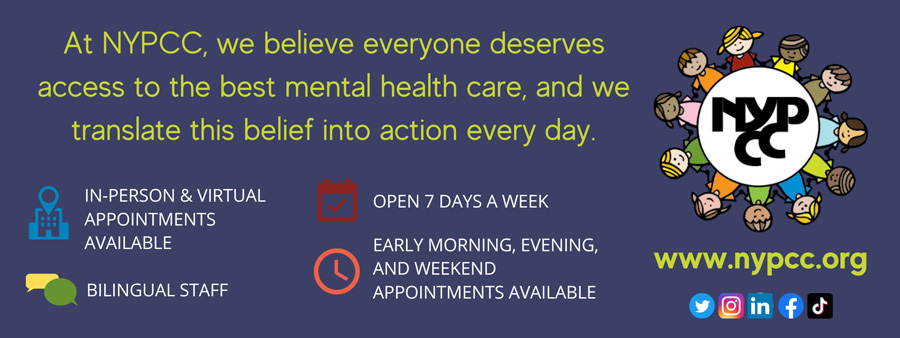The ongoing mental health crisis, exacerbated by widespread staff shortages across behavioral health providers, has highlighted the urgent need for accessible, high-quality mental health services, especially in underserved urban communities. In New York City, organizations like New York Psychotherapy and Counseling Center (NYPCC) are rising to the challenge by harnessing the power of data to expand access to care and continuously improve quality of services.

Founded in 1974, NYPCC is a non-profit behavioral health agency dedicated to providing affordable, culturally sensitive psychotherapy and counseling services to individuals and families in the New York metropolitan area, with a focus on underserved communities. NYPCC serves over 25,000 clients each year through its four in-person locations in the Bronx, Bushwick, East New York, and Jackson Heights, as well as via telehealth services available to clients throughout NYC and New York State.
In July of this year, NYPCC opened a state-of-the-art clinic in Jackson Heights, Queens, to address the shortage of mental health resources in that area. The new facility features expanded capacity, cutting-edge technology, and a diverse staff reflective of the community it serves.
NYPCC has long been an innovator in leveraging data to inform clinical operations and quality improvement efforts. In recent years, the organization has accelerated its adoption of advanced data analytics in order to rapidly scale services and reduce barriers to care across all of its locations and service lines.
Streamlining Intake to Improve Access
One key way NYPCC uses data is to streamline the intake process and reduce wait times for initial appointments. NYPCC strives to maintain no waitlist for services, and by implementing data-driven strategies, the organization has been able to achieve this goal even in the face of high demand and staff shortages.
When a client first reaches out to NYPCC for services, the organization leverages its data systems and other technologies to quickly gather necessary information, process the referral, and match the client with an appropriate provider based on factors like language, location, specialty, and the client’s preference for telehealth or in-person services. By automating and optimizing these processes, New York Psychotherapy and Counseling Center has been able to significantly reduce the time from first contact to initial appointment.
NYPCC also uses predictive analytics to identify times and locations where no-shows for intake appointments are more likely to occur. This allows the organization to double-book appointments during those slots to ensure provider capacity is fully utilized and more clients can be seen. By maximizing the number of people brought into care without overburdening staff, NYPCC is able to maintain timely access even as other providers struggle with long wait times.
Empowering Staff with Data to Enhance Client Engagement
In addition to using data to streamline operations and expand access, NYPCC leverages its data systems to support frontline staff in delivering high-quality, engaging care. All New York Psychotherapy and Counseling Center staff receive various reports that allow them to focus on key clinical and quality measures relevant to their role.
For example, therapists receive regular reports on their clients’ attendance, progress toward treatment goals, and scores on standardized assessments. This enables them to quickly identify clients who may be at risk of disengagement or in need of adjustments to their treatment plan. Supervisors receive aggregate reports on their team’s performance across these measures, allowing them to provide targeted support and coaching.
NYPCC has also developed a real-time dashboard that is used by supervisors and administrators to monitor staff and client engagement at the clinic and organization levels. The dashboard integrates data from the electronic health record, scheduling systems, and other sources to provide a comprehensive view of key performance indicators.
Supervisors can use the dashboard to identify staff members who may be struggling with certain aspects of care delivery, such as maintaining high attendance rates or completing documentation on time. They can then proactively reach out to those staff to offer additional training, resources, or other support. Administrators use the dashboard to track organization-wide metrics and identify areas for system-level improvement.
By putting actionable data in the hands of staff at all levels, New York Psychotherapy and Counseling Center empowers its workforce to continuously monitor and improve the quality and responsiveness of care, even in a challenging and constantly evolving environment.
Leveraging AI for Continuous Quality Improvement
NYPCC is also at the forefront of using artificial intelligence (AI) to drive continuous quality improvement in behavioral healthcare. The organization has developed AI-powered tools that can analyze vast amounts of unstructured data, such as clinical documentation, to identify patterns and insights that might be missed by human review alone.
For example, NYPCC’s AI algorithms can scan case notes to identify clients who may be at higher risk for certain adverse events, such as hospitalization or self-harm, based on subtle changes in language or reported symptoms. The system can then alert the client’s therapist and care team to reassess the treatment plan and provide additional support as needed.
The AI tools can also aggregate and analyze data across the organization to identify best practices and areas for improvement. For instance, if the AI detects that clients working with therapists who use a particular evidence-based technique tend to have better outcomes, it can flag that insight for further investigation and potential scaling across the organization.
Importantly, NYPCC uses AI not to replace human clinical judgment but to augment and support it. Therapists and supervisors are trained to interpret and act on AI-generated insights in the context of their clinical expertise and the unique needs of each client. NYPCC also has robust governance processes in place to ensure that AI is being used ethically and equitably.
By pioneering the use of AI for continuous quality improvement, NYPCC is not only enhancing the effectiveness of its own services but also helping to advance the field of data-driven behavioral healthcare as a whole.
Advancing Health Equity Through Data
NYPCC’s use of data to expand access and improve quality is ultimately about advancing health equity for underserved populations. By leveraging data to optimize resources, proactively engage those in need, and deliver the highest standard of care to every client, NYPCC is working to close long-standing disparities in access to behavioral healthcare.
But data is only as powerful as the actions it enables. The real impact comes when organizations like NYPCC use data-driven insights to drive meaningful changes in how care is delivered and how partnerships with communities can address the root causes of mental health inequities.
As the behavioral health field continues to evolve and embrace the power of data, organizations like NYPCC offer a roadmap for how to harness that power in the service of health equity. By combining cutting-edge technology with a deep commitment to the communities they serve, these providers are not just closing gaps but transforming the landscape of accessible, equitable mental healthcare in a time of unprecedented need.
Josh Klein is VP of Strategy and Business Operations at New York Psychotherapy and Counseling Center (NYPCC).








